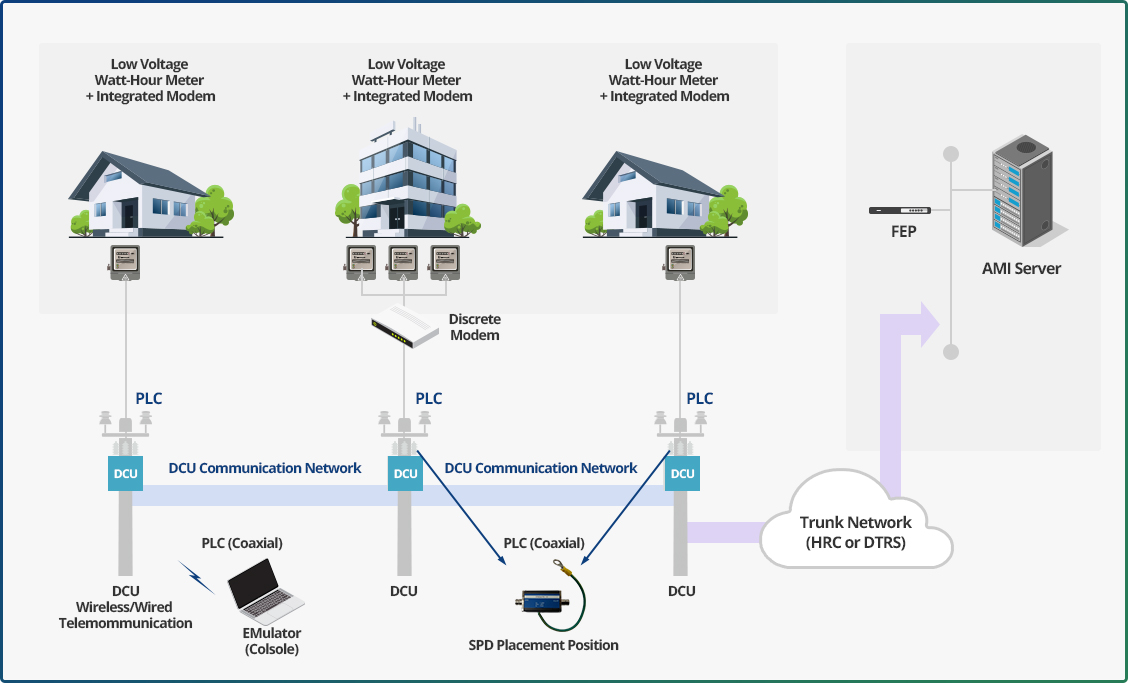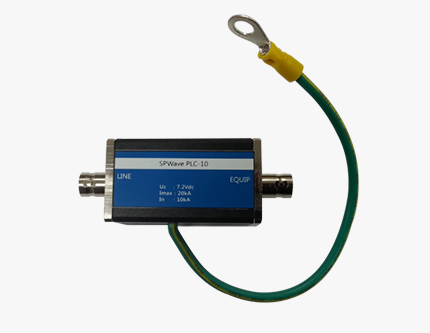PLC-10B
Surge Protection Device
Basic Informations
| Model | PLC-10B |
|---|---|
| Type | Surge Protection Device |
| Applied Fields | Electric Power Company's Network |
| Size | 80(W) x 30(H) x 30(D) mm |
Product Overview
Surge Protective Device (SPD) is equipment that is used to protect electricity and communication network from surge current or overvoltage by bypassing surge current and limiting temporary overvoltage.
Product Information
Product Name
 SPWave PLC-10B
SPWave PLC-10B
Product Blueprint

Signal Characteristic
SPWave PLC-10B is a structure in which Fuse is added in series to the signal line of existing SPD. Additional fuse has very low electrical resistance, and can be used in series with existing SPD signal line without affecting the signal characteristics transmitted through SPWave PLC-10B. SPD’s signal has a characteristic, which will not be affected by components with very low resistance, such as fuse. Therefore the SPWave PLC-10B with the fuse inserted has the same signal characteristics as the existing SPD signal characteristics: 33dB return loss and 0.2dB insertion loss.
Fuse Operation
The existing SPD operates internal protection circuit when there is input of allowable capacity of surge, by transmitting only signals with low voltages as an output. However, if an input surge is larger than the capacity allowed by the SPD, the internal protection circuit might get damaged, and when there is additional input of surge after the damage, SPD will fail to operate and transmit to output, which will ultimately lead to interference on signal.
To resolve this potential threat, SPWave PLC-10B has series connection of additional fuse. The fuse will not operate when there is an input of surge within the allowable capacity of SPWave PLC-10B, and only the protection circuit will operate to perform the same operation as existing SPD. The fuse is designed to operate under the circumstance where there is an input of surge that exceeds the allowable capacity, so that it can protect the output signal from series of input surges that exceed the capacity allowed, and prevent interference of output signal, despite on potential damage on protection circuit.
Maintenance
When the fuse operates, due to the input of surge that exceeds the allowable capacity, SPWave PLC-10B, it does not allow the signal to be transmitted to the output side by cutting off the internal signal line. In this case, replacing SPWave PLC-10B makes it to recover the normal signal transmission between input side and output side.
The status of the fuse inside the SPWave PLC-10B can be checked visually through the transparent window from the case, and whether SPWave PLC-10B should be replaced or not will be determined by condition of the fuse.
[Surge Protection Device (SPWave PLC-10) Applied Example]

Specification
| Test Standard | KS C IEC 61643-21 | |
|---|---|---|
| Rated Voltage | Un | 6V |
| Max Continuous Operating Voltage | Uc | 7.2V |
| Nominal Discharge Current (8/20us) | In | 10kA |
| Max Discharge Current (8/20us) | Imax | 20kA |
| Voltage Protection Level (1kV/500A) | Up | L-S: < 10 L-G: < 40 S-G: < 340 |
| Voltage Protection Level (10kA, 8/20us) | L-S: < 220 L-G: < 40 S-G: < 650 |
|
| Surge Reaction Time | tA | < 1ns |
| Insertion Loss | < 0.2dB | |
| Return Loss | > 33dB | |
| Terminal | BNC(F-F) 75 Ω / 50 Ω (option) | |
| Composition of Components | RoHS compliant | |
| Operating Temperature Range | -40℃ ~ +80℃ | |
| Protection Degree | IP 20 | |
| Weight | 80g | |
| Dimension | 80(W) x 30(H) x 30(D) mm | |
| Install | Bracket Type | |


